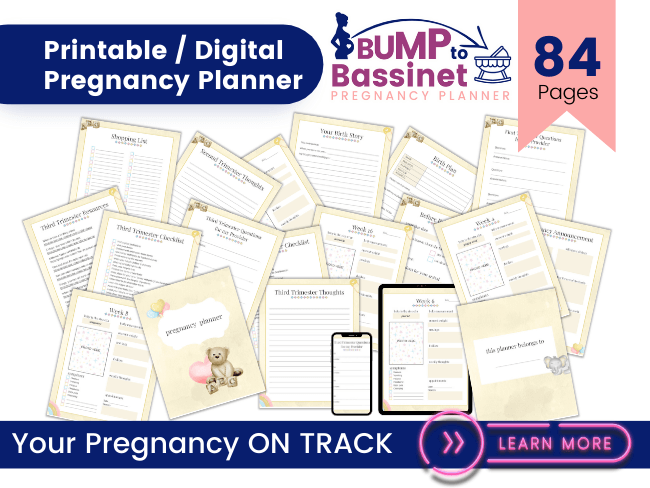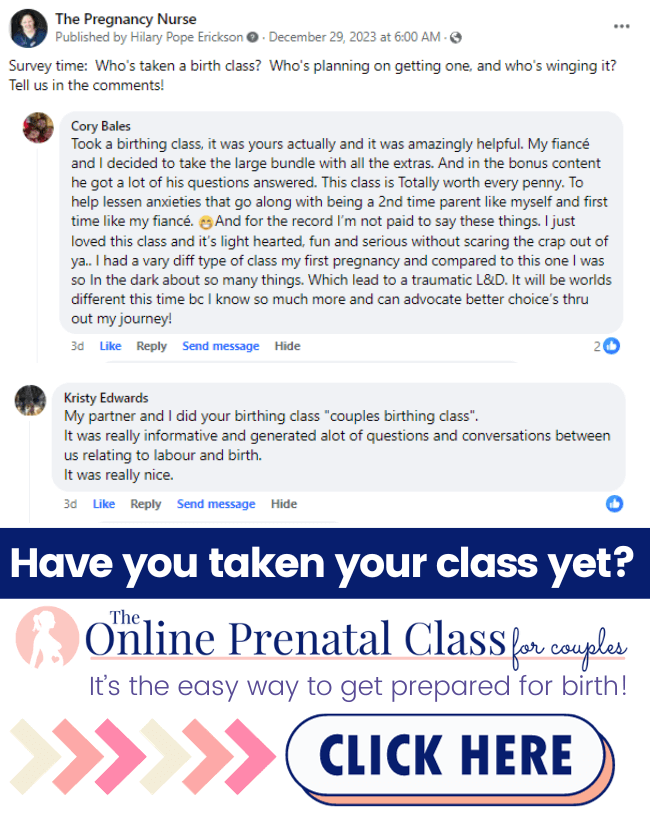When you’re pregnant, it can be difficult to know how often to visit the doctor – and even a little daunting! After all, no one really knows what they’re doing when it comes to this special time in their lives. But there are some good guidelines that should help ease the stress of trying to make sure you’re getting enough health care check ups during pregnancy.

But first, how do I know all of this? Hi — I’m Hilary — The Pregnancy Nurse 👩⚕️. I have been a nurse since 1997 and I have 20 years of OB nursing experience, I am also the curly head behind Pulling Curls and The Online Prenatal Class for Couples. 🩺 I have talked with MANY patients about their prenatal care, as well as doctors or midwives about things that happen in the office, so I am a good resource on this.
I actually give you spots to write down questions or what you learn at prenatal appointments in my pregnancy planner. It’s SO helpful for stuff like this, grab it today!
The Importance of Prenatal Care
Before we get started, I want to just pat you on the back for considering going to a doctor during pregnancy.
Having regular visits with your OBGYN or midwife is one of the best things a parent-to-be can do for both themselves and their baby. Not only will these doctors have valuable insight into any questions or concerns that arise but also knowledge on related topics like nutrition, exercise, prenatal diagnostics tests, delivery method options and much more. For parents who want to ensure they’re giving their unborn baby the best start possible.
I will say that many people think the visits are useless because the doctor doesn’t see anything wrong at your appointments. THIS IS GOOD! We want absolutely “normal” pregnancies. But, these appointments are done at specific weeks because for specific things for you.
Please keep going. If you EVER have a question as to if you can skip a visit (or possibly do it virtual) PLEASE talk with your provider. Don’t just skip appointments. It truly is so important, even though it can seem really simple.

How often do you go to the doctor when pregnant?
In general you first two trimesters you visit the doctor once a month, or every four weeks. So, in weeks (about) 8, 12, 16, 20 and 24.
Then, you’d start going to the doctor about every 2 weeks — Weeks 26, 28, 30, 32, 34
At 34 weeks you’d switch to weekly visits — 35, 36, 37, 38, 39, 40, 41
This gives you a total of 15-17 visits depending on when you start and how long you’re pregnant.
Yes, that’s a lot of visits — and I’m going to give you a few tips for picking a provider later in this article as well!
But, let’s talk a little bit more about these prenatal visits
When should your first prenatal appointment be?
This seems to REALLY vary by each practice. But, I would encourage you to call and make an appointment at your doctor as soon as you find-out you are pregnant. That will give you some time to make it fit into your schedule and see what they prefer.
Some doctors want to see you right away, and some don’t want to see you til’ almost the end of your first trimester.

What would change this prenatal visit schedule?
Any pregnancy complications may adjust your schedule. These are often things like:
- Multiple gestations (like twins or triplets)
- Pre-existing conditions like diabetes or high blood pressure
- Gestational diabetes
- High blood pressure just in pregnancy or signs of preeclampisa
- Issues on your ultrasounds
- Risk factors from previous births
- If your baby was conceived using fertility methods
High-risk pregnancies may also be referred out to see Maternal Fetal Medicine (MFM) — also known as a perinatologist. Most often those doctors don’t deliver babies, they just monitor your prenatal care.
So, you see your regular OB for your prenatal care (and to talk about your delivery) and you’d see the MFM to track your baby’s growth or any health issues either of you is having. On top of that you may also have ultrasound or NST’s ordered. It can be a lot. BTW, wondering why they’d want more ultrasounds or what the heck an NST is? We talk about it right in here.
But if you have a generally healthy pregnancy, those are the visits you’d follow.
Oh, but grab my tailored-to-you pregnancy series to help you stay on top of things even on weeks you don’t have a visit:
First Trimester Prenatal Visits
As I said above these visits are about monthly, but you likely won’t have your first appointment til’ about 8 weeks (or even later if you found-out later).
These visits, at 8, 12 and 16 weeks gestation, will likely include weight/blood pressure measurements, a urine test, likely some STI swabs, as well as some basic blood tests. Your doctor may also perform an ultrasound to check the progress of your baby’s development. You’ll also be given advice about taking prenatal vitamins, diet and exercise during your pregnancy.
The first appointment will be a LOT about insurance (we’ll talk more about the cost of prenatal care more down below), and some blood work. Some people don’t even see the doctor at this visit (but most do). You may also get a pap smear (depending on when your last one was) and a physical to just see your general health early in pregnancy.
Most providers do want an early ultrasound as it helps with figuring-out your due date and makes everyone feel better to see a heartbeat and know that it is a viable pregnancy. Some providers will do this quick ultrasound in the office, or sometimes they send you to an ultrasound clinic.
Then, you’ll have a quick appointment about about 12 weeks. Mostly to talk about any symptoms you’re having and make sure everything is on track (they’ll do any physical things necessary at this appointemnt if you didn’t do them at your first appointment).
Quick Tip: Your trimesters go by about 13 and 1/3 weeks — so:
- First Trimester: 0-13 weeks of pregnancy
- Second Trimester: 14-27 weeks
- Third Trimester 28-Delivery (these weeks may vary by a week or so, but in general this is what they consider it)
Pro Tip: You probably think of pregnancy as 9 months, but it is actually 40 weeks. Since months have random #’s of weeks in them it’s better to count by weeks, and your providers will do just that.

Second Trimester Prenatal Visits
During the second trimester most doctors continue to see you every 4 weeks, although some may increase that to every 3 weeks (and with scheduling of holidays or vacations can always sort of mess with when they see you). And, towards the end they may start seeing you every 3 weeks.
Your doctor will do their regular measurements and tests at these appointments and also may discuss any prenatal or genetic testing that you might want to consider. Also important information about nutrition, exercise and lifestyle will be discussed at these appointments.
You’ll also have your 20’ish week ultrasound appointment, where they check to make sure baby’s anatomy is on track (and some people find out the gender at this point in time).
Visits, in general, will be pretty short, but it’s important to bring your questions with you to the appointment, so that you have them answered. And yes I have a spot in here for you to keep your questions and bring them to your appointment with you).
These visits are NOT too soon to bring up some preferences for labor as well. So, start thinking about what you hope for your birth early on! If you’re interested about thinking about your birth plan I do offer one in here as well as tips on creating yours.
The end of your second trimester, beginning of your third is a GREAT time to get a prenatal class in — I recommend this one.
Third Trimester Prenatal Visits
Your 28 week check-up is an important one as your provider will order your glucose tests and may also order Rhogaham if your blood rH is negative (usually given between 26-28 weeks, may also be given earlier in pregnancy if you had bleeding). They may also order labor so check for things like anemia.
You’ll be seeing your doctor every couple of weeks. Visits will continue to be pretty short with important things done:
- Blood pressure (it’s not too early to start noticing issues of preeclampsia, plus it is important to know what your blood pressure is before later pregnancy)
- Weight — I know this one can be a sticky subject, but if you’re suddenly gaining weight it can be a problem with the baby’s growth or the amniotic fluid — it’s important to track this as well.
- They will also measure the baby’s fundal height (from your pubic bone to the top of your uterus) to make sure baby is growing.
I know that all of this seems pretty “simple” compared to ultrasounds and more intervention-focused care, but through time they have found that tracking these things every few weeks can really help them spot problems or concerns with you or your baby’s growth.
At around 34 weeks your visits will switch to weekly. At this point I often feel like I see my doctor more than my husband as I head into my due date.
Important milestones in this section of pregnancy:
At 36 weeks they will do a GBS swab for beta strep screening
They may order a later ultrasound for check for baby’s growth, positioning and placenta (if any other issues are happening with the pregnancy other ultrasounds may be ordered)
Visits may be a bit longer as they make sure that no issues are arising. They may talk to you more about your upcoming delivery and what to expect at the hospital. And you will likely have even more questions for them.
The issue of an induction may come up and all of those are great things to discuss with informed consent with your provider.

Postpartum Care
Most providers see you once or twice after you have your baby.
They’re going to check your blood pressure (preeclampsia can still happen after baby is born). They will check your healing from either your vagina or the scar from your incision. They may also do a pap smear as well as a uterus and breast exam post-baby.
Frankly, this is not nearly enough, but it is what it is in the US.
It is important that you know what is normal during this time and reach out to your provider if anything beyond the normal is happening (they’ll talk to you about what is normal before you go home from the hospital).
A prenatal class can also help you and your partner know what’s normal AHEAD of time so you really understand it when you get home!
How to Pick a Provider?
This is SO important, because providers vary a LOT. A few tips:
- If you’re using insurance, make SURE that they are on your insurance (this can be a COSTLY mistake if they are not)
- Make sure they deliver at the hospital you are hoping to deliver at (some people pick their provider based on where they want to deliver, and some people just go to the hospital their desired provider delivers at).
- Make sure that they aren’t too far away as you will see them frequently. Some people prefer to see someone close to work as their visits may be during the work day. Some people pick someone close to home, that’s a good question
I actually did a podcast on the things to ask your provider to make sure they’re a good fit that I think will be helpful for you:
How much is prenatal care?
The cost of prenatal care varies greatly depending on your insurance and the type of provider you are seeing. Most providers take Medicaid, but not all do so make sure to check with your doctor before scheduling if you have a Medicaid plan. Some private OBs will accept sliding scale payments when needed.
Most often prenatal care is billed as a “global fee” which means it includes all the things during that time of care, plus your delivery. If you switch providers during your pregnancy it can mess-up the global fee and visits would be billed per-visit.
From what I have heard from providers it is around $3,000 for all the prenatal care and the visits with the provider in the office, plus the delivery. This would be their “cash” price (if you are not using insurance) — if you bill with insurance the insurance will negotiate a price with your provider.
I would guess if you end up having a cesarean there is an increased charge for their surgical time (but I don’t know). This would clearly vary depending on where you are located and if your visits are with an OB or with a certified nurse midwife.
I hope this answered a lot of the questions you had about your prenatal care. I do love answering questions.
Come join me in The Online Prenatal Class for Couples. In just a few hours we can prepare you for your hospital delivery.
And, if you’re not quite sure you’re ready for that whole thing, check out my free prenatal class. It’s your first step toward getting in the driver’s seat of your birth.







 Can You Get Laser Hair Removal While Pregnant?
Can You Get Laser Hair Removal While Pregnant?
